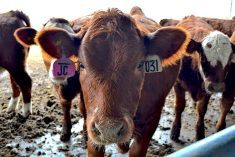Budget cuts at the Canadian Food Inspection Agency won’t weaken food safety protection, says Agriculture Minister Gerry Ritz.
“Food safety is a priority for this government,” Ritz told the Commons agriculture committee, adding a big chunk of the planned cost cutting will come from the winding down of the listeria inquiry into the 2008 tainted deli meat tragedy.
Any further cuts will depend on the contents of the March 29 budget, but the government has no plans to trim food safety inspections, Ritz said.
But NDP Agriculture Critic Malcolm Allen said the agency shouldn’t see any funding cuts because it only inspects two per cent of food imports and its budget is “considerably below where it was before the listeriosis crisis.”
Read Also

Alberta boosts investment in wetland restoration
The province plans to add 67 hectares of new wetlands to strengthen natural flood and drought defences and improve water quality.
Ritz countered the CFIA has added 733 new food inspectors in the last few years and now has staff of about 7,500.
“We have roughly one administrator, one inspection staff, a one-to-one ratio, whereas it used to be as high as 2:1 at one point with the administration side,” said Ritz. “Last year $100 million was added into CFIA’s budget.”
Ritz also rejected claims imported food isn’t inspected.
“This fiscal year, to date, we’ve had 99 border blitzes and 480 enhanced inspections at the border. We also use a system now where there’s a lot more inspection done at point of origin — that is, the plant in the U.S., or so on, as the product comes up.”
The CFIA no longer provides importers with 72 hours advance warning of an inspection because “that didn’t work really well” and has stepped up audits in food plants in 10 countries that account for 79 per cent of the products imported into Canada, Ritz said.
The agency is handing off food inspection in Manitoba, Saskatchewan and B.C. to provincial bodies during the next 18 months, said Barbara Jordan, CFIA associate vice-president for operations.
“The safety systems themselves are not changing,” she said. “It is a question of who is doing the delivery.”














